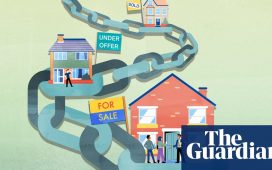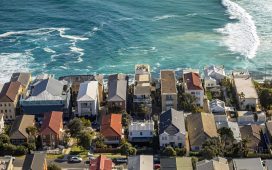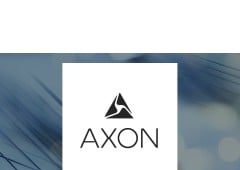Unlock the Editor’s Digest for free
Roula Khalaf, Editor of the FT, selects her favourite stories in this weekly newsletter.
German property is in a pickle.
Higher interest rates have meant a 12 per cent annual decline in commercial valuations in the final quarter of last year — the largest on record, according to the association of Pfandbrief banks this week. The fallout from the implosion of René Benko’s luxury property group, Signa, has highlighted mounting distress in the commercial real estate sector.
Residential property appears to be faring better, supported by strong demand from tenants and growing rents. Don’t believe that will last.
Shares in big residential landlords like Vonovia, TAG and LEG have all rallied since the end of last year, outperforming commercial property owners. Chief executives have served up words of comfort: Vonovia’s Rolf Buch thinks the bottom is close and LEG’s Lars von Lackum said the market is not going to implode.
In reality, further writedowns for property owners seem inevitable. But it is further up the value chain, with developers, that the real pain is being felt.

A boom in new construction, sales and home prices all accompanied the low interest rate era. With its end, all are in free fall. Rising costs squeeze the profitability of developers who need a steady sales pipeline to finance more supply. For the most leveraged, the math simply no longer adds up as residential yields have moved above 4 per cent. And unlike for owners, there is little in the way of consolation from rising rents. A series of developer insolvencies last year resulted in calls for government support to address a housing shortage.
There are parallels with the UK where housebuilders are consolidating thanks to poor market conditions. In Germany, a more fragmented market means smaller and less resilient builders. That means consolidation is coming, with opportunities for distressed investors.
Well placed to capitalise is the country’s only listed pure developer, Instone, which builds larger multifamily projects. The group has suffered the same problems as its smaller peers. Its market value peaked in 2021 at €1.3bn. It is worth less than a third of that today after sales cratered. Net debts of just 2.8 times ebitda in the third quarter of last year, including a substantial cash pile, provides firepower for deals.
Instone shares have outperformed sharply over the past three months, rising 20 per cent, with expectations that residential demand is set to return. But the company, which counts the ActivumSG private equity fund as a 30 per cent owner, could also be a vehicle for those seeking to gobble up assets from any overstretched groups.
The starting gun for getting into distressed German property is about to sound.
Lex is the FT’s flagship daily investment column. If you are a subscriber and would like to receive alerts when Lex articles are published, just click the button “Add to myFT”, which appears at the top of this page above the headline











